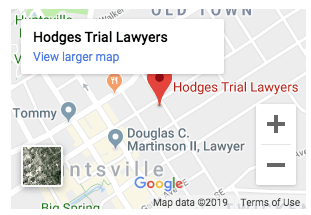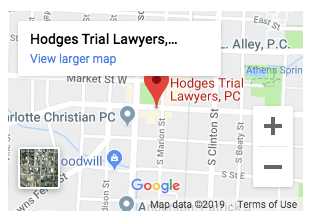You’ve been injured, perhaps in a slip-and-fall incident or a car accident. The next thing you know, the other party’s insurance company has called you. They just want to talk, find out what happened to you, and figure out who’s to blame—right? Unfortunately, it’s not that simple. The more information you give the insurance company, the more you put your own injury claim at risk.
Find out what the insurance company is looking for when they ask for a recorded statement and what you should tell them. Get the help you need with your claim by calling Hodges Trial Lawyers at 256-826-4129.
Which Insurance Company?
First, it matters which insurance company is asking you. You should cooperate with your own insurance company throughout their investigation. In fact, your cooperation is likely part of your agreement with them. Impeding their investigation or refusing to take reasonable steps to settle your claim could put you in violation of your contract.
However, you do not have the same agreement with the other party’s insurance provider. You have no obligation to help them, and more importantly, they have no obligation to help you.
How the Other Party’s Insurance Company Will Use Your Statement
That last part is important. Remember this: it does not matter if the insurance adjuster is friendly, helpful, or the nicest person you’ve ever met. Their obligation is to their own client and their employer, not to you.
If you give a recorded statement, be ready for them to go through it and take note of every detail. Since they can review it as many times as they want, they can look for inconsistencies, ambivalent language, or anything that indicates that you may be to blame for the accident. Should you be interviewed later for your claim, they will check every word you say against your written statement. Any differences, no matter how meaningless or unintentional, will be used to tear down your case and your credibility.
Your Statement Could Harm Your Case
As you may imagine, having everything you say picked apart could seriously harm your case. If there are any discrepancies between retellings, the insurance company will use that as evidence that your entire story is fabricated or exaggerated. This is obviously a misuse of your words, but at that point, it’s too late. You’ve already given your recorded statement, and you can’t stop them from using it.
In case it isn’t clear enough, you should not give a recorded statement to the other party’s insurance company. The very best outcome for you is that the statement has no effect on your case. In this outcome, you say nothing that implicates you and nothing that can be used against you in any way. This is fairly rare. In the worst-case scenario, you misspeak and say something that derails your entire claim or allows the insurance company to pin the blame on you.
What You Should Do Instead
If you can’t give a recorded statement to the insurance company, what should you do instead? It’s fairly simple: hire a personal injury attorney to take over communication for you.
At this point, you should know that insurance adjusters are very good at misconstruing your words and building strong claims against legitimate victims. You stand little to no chance against them, but an experienced personal injury attorney knows exactly how to avoid these tricks and fight for you.
For the best possible outcome, reach out to a personal injury attorney as soon as possible after an accident. Tell them what happened, give them the evidence you’ve gathered, and let them get to work. This way, you don’t have to have any direct contact with the other party’s insurance provider. You can leave that you your attorney and focus on what’s really important – recovering from your injuries and getting your life back on track.
Contact Hodges Trial Lawyers Today
If your injury was caused by someone else’s negligence, you may be entitled to compensation. The sooner you connect with a personal injury lawyer after your accident, the sooner they can start building your case. Choose a firm with lots of experience both in negotiations and in trial cases—Hodges Trial Lawyers. Schedule your consultation now by reaching out online or calling us at 256-826-4129.



